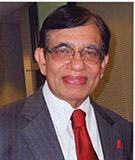
Corona Virus Pandemic: Part VIII
More about vaccines

Let us welcome the New Year with a resolution to observe all pandemic prevention precautions and wipe out SARS-Cov-2 infection. And let us also remember the tremendous sacrifices our healthcare providers have made at enormous personal risk. Their acts of courage and kindness shine through.
Finally, triumph for science! The mRNA COVID-19 vaccines for prevention of the infection are here – light at the end of the long, dark tunnel. U.K. inaugurated the new vaccine by giving it to a 91-year-old, the first step in the long, painstaking campaign to control the pandemic that has killed about 1.7 million people globally. Soon, FDA granted emergency use authorization of Pfizer vaccine after proper review of safety and efficacy data, without cutting corners. And a few days ago, Moderna vaccine, the second one, was also approved for use in the U.S., increasing the number of available doses, which we need desperately to fend off this pandemic. Several top leaders like VP Mike Pence and Surgeon General Jerome Adams already got vaccinated. Some of my friends, physicians and nurses, have also received the first dose, without experiencing any major side effects.
Till a few months ago, we didn’t think the vaccine would actually arrive before Christmas but now the dream has become a reality. Vaccination is our only hope to put an end to this pandemic. Recommendation is to take one dose initially, followed by a booster shot three weeks later. Here are a few facts about vaccines to keep in mind.
-
Efficacy of the vaccine will be much higher in the first few months after completing vaccination because of invariably high antibody counts but may taper off in the later months. Hence, we may have to take the vaccine every year like the flu vaccine.
-
Short-term safety of vaccines is now well-established because these vaccines have been tested in tens of thousands of people. The only exception would be those with severe allergic tendencies to the point they have to carry ‘EpiPen’ Auto-Injector for emergencies.
-
Remember the vaccine is not a magic bullet to put an end to the pandemic. That will depend on how many people in a given community actually receive it. As I mentioned before, about 70 percent of the population need to develop immunity to stop the infection. So if you use a vaccine that has 95 percent efficacy at least 75 percent of the population needs to be vaccinated.
-
What about those people who are reluctant to take the vaccine? Undoubtedly, they will be at a higher risk and it will take a longer time for the development of herd immunity and lessening of the pandemic. Fear and lack of knowledge are the main factors that stand in the way. To overcome this vaccine hesitancy, they need to learn the facts first.
-
Unlike measles and chickenpox, people who have been infected once with SARS-Cov-2 virus can get infected again and re-infections have already been reported. So, you need to take the vaccine that can protect you for up to a year. It’s still possible to get infected after vaccination but the infection is likely to be mild and asymptomatic but it’s an important factor in transmission of infections.
-
Even if you have underlying disease that makes you vulnerable to infections, you can still take the vaccine since this is not a live attenuated virus vaccine. It’s primarily derived from the spike protein of the coronavirus and hence safe enough.
With the pandemic continuing to surge at unprecedented levels, in addition to vaccination, one still need to observe primary prevention protocols with masking, social distancing, hand hygiene and environmental disinfection. Widespread vaccination will help to establish herd immunity, reducing the risk for severe infections, hospitalizations and deaths, bringing a safe end to this pandemic. And a gentle reminder to those who are still skeptical about vaccines: “Risk of dying from the disease is more likely than the risk from vaccination.”
For more information, visit https://www.onmanorama.com/lifestyle/health/2020/12/09/covid-19-vaccines-facts-hype.html
To be continued …
M.P. Ravindra Nathan, M.D., is a cardiologist and Emeritus Editor of AAPI Journal. For further reading, “Second Chance - A Sister’s Act of Love” by Dr. Nathan from Outskirts Press, can be found at www.amazon.com